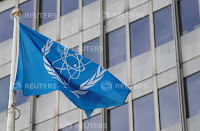A steep decline in nuclear energy capacity will threaten climate goals and power supply security unless advanced economies find a way to extend the lifespan of their reactors, the International Energy Agency said.
Nuclear is currently the world’s second-largest source of low-carbon electricity, behind hydropower, and accounting for 10 percent of global electricity generation. But nuclear fleets in the United States and Europe are on average more than 35 years old and many of the world’s 452 reactors are set to close as cheap gas and tighter safety requirements make it uneconomical to operate them.
“Without policy changes, advanced economies could lose 25 percent of their nuclear capacity by 2025 and as much as two-thirds of it by 2040,” the IEA writes in its first major report about nuclear energy in two decades.
Over the past 20 years, wind and solar capacity has increased by 580 gigawatt GW in advanced economies. Despite that, however, IEA estimates that the 36 percent share of clean energy sources in global power supply in 2018 was the same as two decades ago because of the decline in nuclear.
In order to offset the expected decline of nuclear in the next two decades, renewables investment would have to grow fivefold, but that would not only be hugely expensive, but would also hit public resistance and require major power grid investment, IEA said.
IEA director Fatih Birol said on a webcast that the agency is not asking countries who have exited nuclear to reconsider, but said that countries who did decide to keep nuclear should do more to support the industry.
Birol said the low-carbon nature of nuclear and its role in energy security are currently not sufficiently valued for existing nuclear plants to operate profitably and that new nuclear projects have been plagued by cost overruns.
“Without action to provide more support for nuclear power, global efforts to transition to a cleaner energy system will become drastically harder,” Birol said.
Read more at IEA Rings Alarm Bell on Phasing Out Nuclear Energy

No comments:
Post a Comment